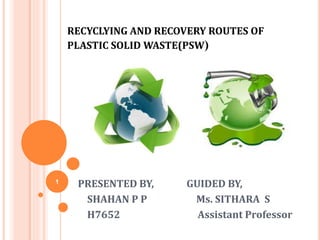
RECYCLYING AND RECOVERY ROUTES OF
- 1. RECYCLYING AND RECOVERY ROUTES OF PLASTIC SOLID WASTE(PSW) PRESENTED BY, GUIDED BY, SHAHAN P P Ms. SITHARA S H7652 Assistant Professor 1
- 2. CONTENTS Scope Introduction PSW treatment options Re-extrusion Mechanical recycling Chemical recycling Energy recovery Thermolysis Pyrolysis Gasification Hydrogenation 2
- 3. SCOPE SOLUTION TO THE MOUNTINGS PROBLEM OF PLASTIC SOLID WASTE. EXPLORE RECYCLING AND RECOVERY ROUTES. 3
- 4. INTRODUCTION Plastics are light-weight, durable, and versatile Disposal has become a major worldwide environmental problem. Non Biodegradable New sustainable processes have emerged Account for the use of 4% - 8% of the global oil production The most appropriate recovery method is chosen considering the environmental, economic and social impact of a particular technique. 4
- 5. 5
- 6. RE-EXTRUTION Re-introduction of scrap, industrial or single-polymer plastic edges. Only feasible with semi-clean scrap. Rarely possess the required quality. Main source are households. Need of selective and segregated collection. 6
- 7. MECHANICAL RECYCLING PSW are recycled into “new” raw materials No change in the basic structure of the material. Performed on single- polymer, eg.PE,PP,PS etc Grocery bags, pipes, window & door profiles etc Costly and an energy intense process. Involves lot of steps. First step is size reduction to pellets,powder or flakes. 7
- 9. THERMO-CHEMICAL RECYCLING Advanced technology. Convert into smaller molecules, usually liquids or gases suitable for use as a feedstock for the production of new petrochemicals and plastics. De- polymerisation. High product yield and minimun residual waste Chemical recycling Method of producing various hydrocarbon fractions from PSW. 1. pyrolysis, 2. Gasification 3. catalytic degradation 9
- 10. THERMOLYSIS Treatment of PSW in the presence of heat at controlled temperatures and environment. Divided into, 1. Pyrolysis 2. Gasification 3. Hydrogenation Pyrolysis • Thermal degradation of plastics in the absence of oxygen. 10
- 11. Applied to PET , PS , PMMA and certain polyamides such as nylon. Advanced conversion technology that has the ability to produce a clean, high calorific value gas. Hydrocarbon content of the waste is converted into a gas, which is suitable for utilization in gas engines or in boiler applications Calorific value of 22–30 MJ/m3 Polyolefins:potential pyrolysis feedstock for fuel (gasoline) production. 11
- 12. BASF PROCESS Main pyrolysis technologies ever commissioned. Mixed PSW is grinded, and separated from metals and agglomerated materials. HCl separated out is absorbed and processed in the HCl production plant. 12
- 13. GASIFICATION Partial oxidation of plastic waste. Operated at high temperatures (600°C- 800°C). Air or oxygen- gasification agent. Primary product : mixture of CO, H2 with minor percentages of gaseous hydrocarbons. This mixture is syngas. Attractive alternative to direct incineration. 13
- 15. Any material that contains carbon can be gasified. Advantage of using air instead of O2 alone is to simplify the process and to reduce the cost. Disadvantage is N2 being present causing the reduction in the calorific value of resulting syngas. 15
- 16. DISPOSAL METHODS Burning thermal processing in the absence of air or oxygen thermal processing with a limited amount of air or oxygen INCINERATION PYROLYSIS GASIFICATION 16
- 17. AUTOMOTIVE SHREDDER RESIDUE Aggregate that remains after a vehicle has been shredded. Practical value as recyclables. Eg.plastics, rubber, fiber, glass, residual metal etc Recent devolopment involves the gasification of ASR. 17
- 18. TEXACO GASIFICATION PROCESS Consists of two parts, Liquefaction step o Plastic waste is mildly thermally cracked. o Synthetic heavy oil and some condensable and non- condensable gas fractions. o Non-condensable gases are reused in the liquefaction as fuel Entrained bed gasifier o Oil and condensed gas produced are injected to the entrained gasifier. o 1200°C - 1500°C. o After cleaning processes ,clean and dry synthesis gas formed consisting predominantly of CO and H2. 18
- 19. 19
- 20. HYDROGENATION Addition of hydrogen (H2) by chemical reaction through unit operation. Veba Combi-Cracking- most robust, commercially proven hydrogen addition technologies available in the marketplace today. Process refinery residues, heavy crude oil and coal. 20
- 21. ENERGY RECOVERY Burning waste to produce energy in the form of heat, steam and electricity. Sensible way of waste treatment, when material recovery processes fail. Plastic materials possess a very high calorific value. High heating value of plastics make it a convenient energy source. Producing H2O and CO2 upon combustion make them similar to other petroleum based fuel. 21
- 22. CALORIFIC VALUE OF SOME MAJOR PLASTICS COMPARED WITH COMMON FUELS….. Item Calorific value (MJ kg−1) Polyethylene 43.3–46.5 Polypropylene 46.50 Polystyrene 41.90 Kerosene 46.50 Gas oil 45.20 Heavy oil 42.50 Petroleum 42.3 Household PSW mixture 31.8 22
- 23. CONCLUSIONS Recycling technologies of PSW have contributed greatly to the eco-image of waste management. Certain disadvantages appear when mechanical recycling is chosen. Tertiary treatment of waste plastic articles is by far a more sustainable solution. (PSW) is derived from oil and has a recoverable energy, in some cases comparable to other energy sources. Many tertiary and quaternary technologies appear to be robust to warrant further research and development in the near future. 23
- 24. REFERENCES Gasification of plastic waste as waste-to-energy or waste-to-syngas recovery route Vol.5, No.6, 695-704 (2013) http://dx.doi.org/10.4236/ns.2013.56086 Baeyens, J., Brems, A. and Dewil, R., (2010) Recovery and recycling of post- consumer waste materials—Part 2. Target wastes (glass beverage bottles, plastics, scrap metal and steel cans, end-of-life tyres, batteries and house- hold hazardous waste). International Journal of Sustainable Engineering, 3, 232-245. doi:10.1080/19397038.2010.507885. Al-Salem, S.M., Lettieri, P. and Baeyens, J. Recycling and recovery routes of plastic solid waste (PSW): A review. Waste Management, 29, 2625-2643. doi:10.1016/j.wasman.2009.06.004 Harder, M.K. and Forton, O.T. A critical review of developments in the pyrolysis of automotive shredder residue. Journal of Analytical and Applied Pyrolysis, 79, 387-394. doi:10.1016/j.jaap.2006.12.015. 24
- 25. THANK YOU….. 25
